RIP Robert Fisk – the Most Brilliant and Fearless Middle East Reporter of his generation
Robert Fisk – The Death Of A ‘Controversial’ Journalist Who Didn’t Hesitate to Challenge the ‘Competing Narratives’ of War
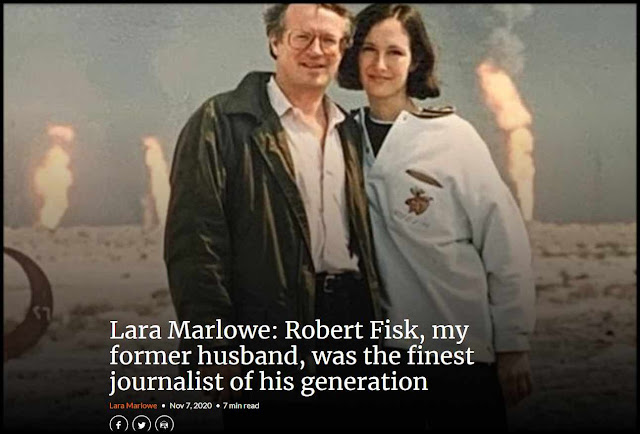
Robert Fisk – by Lara Marlowe
Robert Fisk (12 July 1946 – 30 October 2020) was without doubt the greatest Middle East correspondent of our age and probably of all time. It was the Independent’s good fortune to have the two finest Middle East correspondents, Robert Fisk and Patrick Cockburn, amongst the British press. This in itself speaks volumes about the rest of the press.
I had the good fortune to listen to Fisk speak, shortly after the outbreak of the Iraq war, at my almer mater, St. Mary’s College, Strawberry Hill, which I attended from 1980-81 when Brighton Polytechnic and Sussex University, blacklisted me.
A teacher training college, its Deputy Principal was an outstanding Roman Catholic priest, Father Michael Prior who was passionate about the plight of the Palestinians and went on to found Living Stones. I happened to be the only Jewish student there but never felt disadvantaged because of that although being a PGCE student much of my time was spent out of the college.
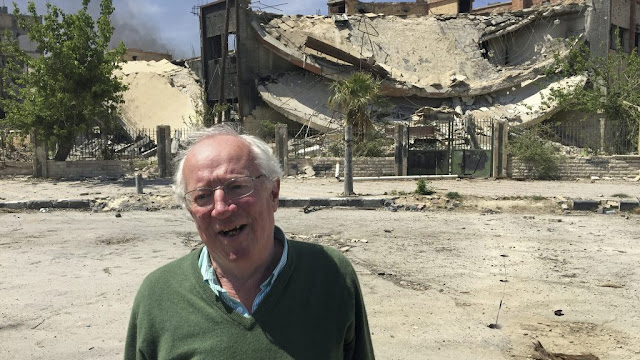
In or around 2004 Robert Fisk had been invited to talk about the attack on Iraq by the United States and Britain and a riveting talk it was. I particularly remember his description of the ‘War on Terror’ as a war against an abstract noun. That particular phrase captured the absurdity of believing that through overwhelming military might one could overcome ‘terrorism’ without dealing with its causes.
Robert Fisk saw service in most of the world’s hotspots beginning with Ireland and covering the Balkans, the Middle East and Afghanistan. He was originally employed by The Times but it was impossible for any fearless journalist to survive for long in Rupert Murdoch’s Empire. When an Iranian passenger airliner was shot down by the USS Vincennes over the Gulf in 1988 the Times spiked his explanation as to what had happened.
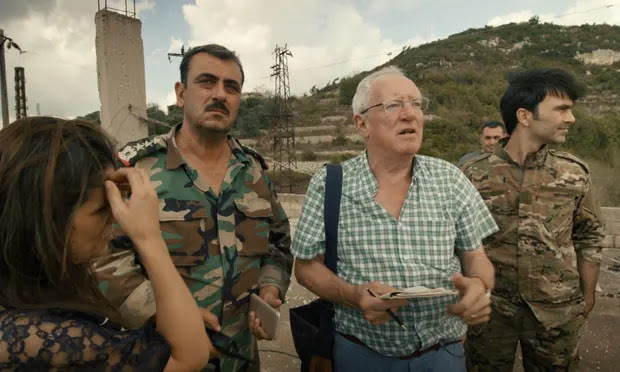
The US had been harassing civilian aircraft in the Gulf for some time but The Times chose to carry the United States lying and exculpatory propaganda that the pilot of the airliner had been intent on a suicide mission to sink the USS Vincennes rather than the fact that it was deliberately shot down whilst posing no threat to the US ship.
What is striking is how, in the most military and politically fraught area in the world, the Middle East, the site of US imperialism’s constant wars for oil and strategic domination and its attacks on the basic rights of the people of the area, via its Saudi and Israeli protégés, coverage by the rest of the press is so appalling.
I don’t even know if the Guardian has a Middle East correspondent anymore. The paper’s coverage has been Freedlandised or as they used to say Bowdlerized. Yet in the past the Guardian too has produced brilliant Middle East correspondents. Michael Adams was the first Western reporter to break with the pro-Zionist hegemony of the press, despite being hindered at the time by his editor Alistair Hetherington, who spiked his coverage of Israel’s demolition of 3 villages in the West Bank, including the Biblical village of Emmaus, [see The Road to Emmaus: the papers of Michael Adams (1920-2005) following the 1967 War. David Hirst followed in the same tradition and Ian Black, despite disagreeing with much of his analysis, was certainly aware of the history of Zionism and what it had done to the Palestinians.
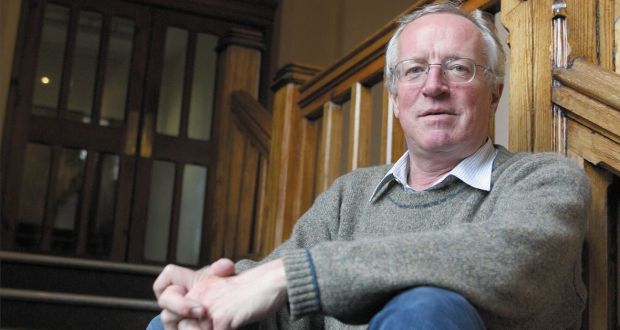
Today despite being the location of almost permanent warfare and destabilisation, from Syria to Libya to Yemen, coverage of the politics of the area and the motivation of its western actors is poor to non-existent. This was Robert Fisk’s strength. He took the time to know the area. He lived in Beirut for a long period. He didn’t employ stringers, local journalists who would find out the information for him and he didn’t rely on briefings from the US or Israeli military.
The most pertinent and acute article on the death of Robert Fisk, which I produce below, is that of Media Lens.which points out that almost all obituaries and tributes have used the weasel word ‘controversial’ It asks why an anti-war correspondent, someone who treated the explanations and justifications of the imperial war mongers with skepticism and disbelief, should be considered ‘controversial’ when Zionist ‘journalists’ like Jonathan Freedland are considered uncontroversial.
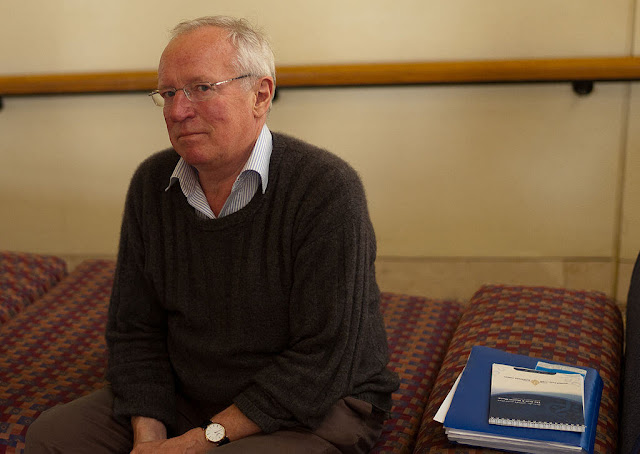
Well we all know the answer to that question or we should do. Freedland represents vested interests, Chatham House, the British and US Establishment. He and his ilk are simply the mouthpieces for imperialism. The Guardian and most of the press simply reflect the opinions and interests of the military-industrial complex and for that reason will never be considered controversial because they are by definition mainstream. I never tired of quoting Marx’s observation in the German Ideology that the ruling ideas in any society are those of its ruling class.
Hence why the horrific toll in the Yemen war gets so little mention and why, despite the demonisation of Saddam Hussein no one comments on the horrific human rights record of the current Iraq regime which is almost certainly worse than Saddam Hussein. Likewise why the Egyptian tyrant Sisi with his heavy toll of executions isn’t even mentioned whereas the clampdown by China in Hong Kong is all the rage. No one points out Blair’s hypocritical justification for regime change was Saddam’s appalling human rights record. Of course it was appalling but so is that of the Saudis.
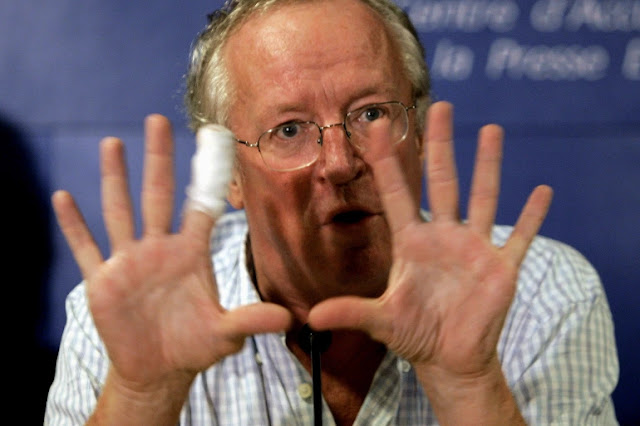
The Guardian unsurprisingly has used the same description as the ret of the press, informing its readers that Fisk ‘was a controversial figure, known for his criticism of the US.’ This is a form of newspeak, ‘Controversial’ for the Guardian means challenging the United States’ hegemonic narrative. For the Guardian these days that is indeed controversial. After Biden’s election they informed us that Joe Biden ‘will have to reassert America’s role as the global problem-solver.’
I have to confess that I find it difficult to recall one problem that the United States has solved. It is a problem creator from Vietnam to Central/Latin America to Indonesia to the Balkans. However I accept that when your record includes supporting the Iraq War then myopia is an inevitable disability.
Fisk was bold and fearless and had nothing but contempt for the kind of ‘hotel journalism’ that most of the press indulged in during the Iraq War when reporters wrote their stories confined to their hotel rooms. He had equal contempt for ‘embedded journalists’who did their reporting whilst accompanying the military. Their perspective could not be other than from the point of view of the invaders.
The Guardian found Fisk especially ‘controversial’ because he‘tended to absolve the Assad regime of some of the worst crimes credited to it, provoked a backlash, even among his anti-imperialist acolytes’ What the Guardian really means is as Media Lens commented
Whistleblowing revelations relating to OPCW and the alleged chemical weapons attack in Douma, Syria, while almost completely ignored by the ‘mainstream’, have overwhelmingly vindicated Fisk and made a nonsense of official claims. See Chomsky: OPCW cover-up of Syria probe is ‘shocking’ and here.
This was the alleged attack which caused Donald Trump to order a cruise missile attack on Syrian forces. It has now been shown to be entirely fake, as many of us suspected at the time.
The real beef that the Guardian and the rest of the Prostitute Press had with Fisk was that he was a genuine journalist and one who operated within the ambit of anti-imperialism, i.e. opposition to the West. This is, quite understandably baffling to the war makers.
Fisk was the same journalist who, alone, had revealed the horrific massacre by Hafez al-Assad, the Syrian President’s father, in Hama when Syrian troops put down a rebellion by the Muslim Brotherhood with an estimated 20,000 civilian deaths. They simply razed whole neighbourhoods Israeli fashion. But this was a massacre of which the West approved and so there was little publicity given to what happened. There was no self-criticism by the Guardian or any other of the press prostitutes as to why they had not covered it at the time.
Fisk lived in Beirut during the civil war and the hostage crisis that led to the long imprisonment of Terry Waite and the death of others. Fisk had what most war reporters today don’t have and that is personal courage and commitment. He also insisted in talking to the people of the areas ravaged by imperialism rather than talking to other talking heads. These were unforgivable crimes in the eyes of those reporters who never ventured outside their hotel in the Green Zone in Baghdad, unless in the company of US military.
It is no surprise that that other great war reporter, Seymour Hirsh, who uncovered the My Lai massacre, has also been silenced over the question of false claims of Syrian use of chemical weapons. See for example New exposé by Seymour Hersh: Turkey staged gas attack to provoke US war on Syria
Robert Fisk was almost alone today in challenging the way that Western reporters have, with their use of language, become propagandists for war and imperial conquest. Instead of talking about justice and injustice they use the term ‘competing narratives’. As if what is at stake is a different historical perspective. The occupied territories of Palestine become ‘disputed territories’. Imagine a burglar entering your home and telling the police that he disputes the ownership of what he has stolen because his ancestors lived there a couple of thousand years ago. Yet this is the rationale behind the theft of Palestinian land today.
Just imagine that the British press had described the demonisation of Jews in Nazi Germany, since Hitler is everyone’s enemy, as a ‘competing narrative’. Yet that is what the Daily Mail and others in the British press did. They doubted the severity of the persecution of the Jews and ‘understood’ that the Germans resented the domination by Jews of sections of the German economy. But all this is forgotten now. The press also has rather a large memory hole for the things it prefers that we should forget.
So when the Americans describe their actions in the Middle East as being a war for democracy rather than a war for domination of the oil and resources, there is no pushback either by the BBC or The Guardian.
Fisk’s awareness of how language is used to sanitise violence and oppression marks him out as following in the tradition of Orwell, with his concepts of Newspeak and Double Think and it was fitting that he was awarded the Orwell Prize. A prize that has been brought into disgrace by being awarded to war propagandists such as David Aaronovitch and Suzanna Moore.
The very fact that Fisk was hated and despised by our rulers and treated with the kind of contempt with which the Guardian in particular specialises, is in itself a testimony to his achievement as a journalist. He spoke truth to power rather than defending their propaganda.
Below is the article I mentioned in Media Lens on how the fake news outlets could not let go of these resentments and envy over the reputation of one of the last genuine journalists in the employ of the British press.
Tony Greenstein
Robert Fisk – Death Of A ‘Controversial’ Journalist
Robert Fisk, the Independent’s Middle East correspondent, died on 30 October aged 74. In reviewing his life and career, the newspaper for which he worked for more than two decades wrote of their star reporter:
‘Much of what Fisk wrote was controversial…’
As John Pilger noted, in describing Fisk’s journalism as ‘controversial’ the Independent was using a ‘weasel word’.
The Washington Post published a piece titled:
‘Robert Fisk, daring but controversial British war correspondent and author, dies at 74’
Al Jazeera’s piece was subtitled:
‘The Independent newspaper confirms its acclaimed and controversial journalist died following a short illness.’
A piece in Le Monde was titled:
‘La mort de Robert Fisk, grand reporter au Moyen-Orient et personnage controversé’ (Christophe Ayad, Le Monde, 4 November 2020)
The trend is clear. When The Times subjected Fisk to one of its full-on hit pieces in April 2018, it wrote: ‘Fisk is no stranger to controversy.’
So why do ‘mainstream’ commentators feel obliged to red-flag Fisk’s journalism with ‘controversial’ in this way, and why is it a ‘weasel word’?
Was that ‘controversial’? How about this?
Andrew Marr – the BBC’s execrable Tory war monger
Consider that the likes of the BBC’s Andrew Marr, the Guardian’s Martin Chulov and The Times’ David Aaronovitch, and numerous others, will never be described as ‘controversial’, despite their highly controversial, in fact outrageous, warmongering bias.
Marr is not labelled ‘controversial’ for supporting a ground invasion of Serbia in 1999:
‘I want to put the Macbeth option: which is that we’re so steeped in blood we should go further. If we really believe Milosevic is this bad, dangerous and destabilising figure we must ratchet this up much further. We should now be saying that we intend to put in ground troops.’ (Marr, ‘Do we give war a chance?’, The Observer, 18 April 1999)
Was it ‘controversial’ for the Guardian to write this of the country that has relentlessly waged war and supported tyranny around the world since 1945:
‘Joe Biden looks to have done enough to win the White House… He will have to reassert America’s role as the global problem-solver.’
Was it ‘controversial’ for the supposedly impartial global news agency, Associated Press, to write this of the United States:
‘For decades, the U.S. has been an advocate for democracy abroad, using diplomatic pressure and even direct military intervention in the name of spreading the principles of a pluralistic system with a free and fair vote for political leaders’?
An awesome level of gullibility is required to believe that the direct military ‘interventions’ (wars) in oil-rich Iraq and Libya were about spreading pluralistic principles. Whether or not Iraqis have had ‘a free and fair vote’ since 2003 is a matter of complete indifference to Western politics and journalism.
It turns out that the term ‘controversial’ is only applied in corporate media to political writers and leaders deemed ‘controversial’ by elite interests.
This was unwittingly made clear by the big brains at the BBC who noted that Fisk ‘drew controversy for his sharp criticism of the US and Israel, and of Western foreign policy’. If Fisk had drawn ‘controversy’ from China, Iran or North Korea, the ‘weasel word’ would not have appeared in the Beeb’s analysis.
A second piece in the Independent also allowed us to read between the letters that make up ‘controversial’:
‘Often writing and speaking of his pity for the people he saw being killed at the same time as becoming a forthright critic of the US and Israel. His writing could be controversial – such as his later reporting on Syria…’ (Our emphasis)
Fisk is not alone, of course. The BBC controversially echoed numerous other media in describing Hugo Chavez as ‘Venezuela’s… controversial president’.
If Chavez was ‘controversial’, which national leader is not? Should they all be described as ‘controversial’? By the way, Biden very controversially described Chavez’ successor Nicolas Maduro as a ‘tyrant’, adding:
‘I was among the first Democratic foreign policy voices to recognize Juan Guaidó as Venezuela’s legitimate leader and to call for Maduro to resign.’ (See here for more on Biden’s grim record.)
As we have discussed, these were deeply embarrassing propaganda claims in pursuit of regime change. Even the BBC was eventually forced to give up the pretence that Guaidó was ‘interim leader’, reverting to the title ‘opposition leader’.
Although Obama bombed seven Muslim countries from 2009 to 2017, all but destroying Libya, the BBC would, of course, never refer to ‘America’s controversial president, Barack Obama’, or even to ‘America’s controversial president, George W. Bush’. Specific Bush policies might be described as ‘controversial’, but the term would never be applied as a broad brush description of who he is.
In corporate media newspeak, ‘controversial’ can actually be translated as ‘offensive to power’. The term is intended as a scare word to warn readers that the labelled person is ‘dodgy’, ‘suspect’: ‘Handle with care!’ The journalist is also signalling to his or her editors and other colleagues: ‘I’m not one of “them”!’
The same effect can be achieved by praising establishment figures. Peter Oborne did not cover himself in glory by tweeting:
‘Tony Blair has emerged as probably the most authoritative and persuasive voice during the Covid crisis.’
As we noted:
‘If it was some other leader of some other country who had waged an illegal war of aggression killing one million people, Oborne might not have sent this.’
Journalists and leaders who serve power, including ‘Teflon Tony’, somehow retain fundamental ‘respectability’, are welcomed by elite media and the powers that be. (For completists interested in this subliminal misuse of language, the same use is made of the term ‘narcissist’: Julian Assange, Russell Brand, George Galloway, Glenn Greenwald, Seumas Milne, John Pilger, Edward Snowden, Hugo Chavez, and – alas! – us at Media Lens, have all been repeatedly accused of ‘narcissism’. Recently, Andrew Rawnsley wrote of the almost comically humble and selfless Jeremy Corbyn:
‘Many things have been said about his character over the years, but one thing has not been said enough: he is a narcissist.’
An unwitting, backhanded compliment from the Observer’s great warmonger. (See our book ‘Propaganda Blitz’ for more discussion on ‘narcissism’, Pluto Press, 2018, pp.54-55)
‘How Do They Get Away With These Lies?
In 2004, at a time when all of US-UK journalism was celebrating the ‘transfer of sovereignty’ from the forces still occupying Iraq and stealing its oil, Fisk was a rare voice mocking the charade:
‘Alice in Wonderland could not have improved on this. The looking-glass reflects all the way from Baghdad to Washington… Those of us who put quotation marks around “liberation” in 2003 should now put quotation marks around “sovereignty”.’ (Fisk, ‘The handover: Restoration of Iraqi sovereignty – or Alice in Wonderland?’ The Independent, 29 June 2004)
In 2014, after Tony Blair made one of his frequent attempts to exonerate himself in relation to Iraq while calling for more violence to bomb Syria better, the Guardian editors performed painful contortions in declaring Blair’s analysis ‘thoughtful’ if ‘wrong-headed’. Fisk’s response to Blair was different:
‘How do they get away with these lies?’
Fisk was also a virtual lone ‘mainstream’ voice contesting the US-UK’s audacious, well-funded attempts to re-run their Iraq ‘weapons of mass destruction’ scam in Syria:
‘Washington’s excuse for its new Middle East adventure – that it must arm Assad’s enemies because the Damascus regime has used sarin gas against them – convinces no-one in the Middle East. Final proof of the use of gas by either side in Syria remains almost as nebulous as President George W. Bush’s claim that Saddam’s Iraq possessed weapons of mass destruction.’
For this, as the obituaries make unsubtly clear, Fisk was never forgiven.
An obituary in The Times commented on Fisk:
‘While he was an outstandingly poetic writer, he developed an emotional obsession with the plight of the Palestinian people and a visceral dislike of the Israeli government and its allies, especially America. In the jargon of news reporting he “went native”, unable to provide a dispassionate account of events and their context.’ (‘Robert Fisk: Obituaries – Trenchant yet lyrical foreign correspondent who interviewed Osama bin Laden three times and was often accused of “going native”‘, The Times, 3 Nov 2020)
Given the appalling racism and ethnic cleansing faced by the Palestinian people, the reference to Fisk ‘going native’ was a grotesque observation.
The Times noted, of course, that Fisk ‘remained no stranger to controversy’. It asked us to believe that ‘critics poured cold water on Fisk’s writing’, although ‘awards committees did not’. In translation: Fisk was subjected to exactly the kind of ugly propaganda smears from ‘critics’ contained in The Times’ obituary.
The comments are no great surprise, given the honesty with which Fisk described his departure from The Times to join the Independent in 1989:
‘The end came for me when I flew to Dubai in 1988 after the USS Vincennes [a US Navy guided missile cruiser] had shot down an Iranian passenger airliner over the Gulf. Within 24 hours, I had spoken to the British air traffic controllers at Dubai, discovered that US ships had routinely been threatening British Airways airliners, and that the crew of the Vincennes appeared to have panicked. The foreign desk told me the report was up for the page-one splash. I warned them that American “leaks” that the IranAir pilot was trying to suicide-crash his aircraft on to the Vincennes were rubbish. They agreed.
‘Next day, my report appeared with all criticism of the Americans deleted, with all my sources ignored. The Times even carried an editorial suggesting the pilot was indeed a suicider. A subsequent US official report and accounts by US naval officers subsequently proved my dispatch correct. Except that Times readers were not allowed to see it.’
Fisk said that he believed Murdoch did not personally intervene. However:
‘He didn’t need to. He had turned The Times into a tame, pro-Tory, pro-Israeli paper shorn of all editorial independence.’
Echoing virtually every other obituary, the Guardian commented that Fisk ‘tended to absolve the Assad regime of some of the worst crimes credited to it’, which had ‘provoked a backlash, even among his anti-imperialist acolytes’.
It is ironic that the Guardian should highlight Fisk’s supposed tendency to ‘absolve’ Syria of ‘the worst crimes credited to it’. Whistleblowing revelations relating to OPCW and the alleged chemical weapons attack in Douma, Syria, while almost completely ignored by the ‘mainstream’, have overwhelmingly vindicated Fisk and made a nonsense of official claims. See recent comments here from Noam Chomsky, and excellent in-depth analysis here.
The Guardian naturally deployed the ‘weasel word’ in noting ‘all the controversy generated by his later commentary on the evils of western, and specifically US, involvement in the Middle East’. This was followed by a distorted version of ‘balance’:
‘Some of Fisk’s most ardent admirers have suggested that to describe his journalism as controversial is a vulgar slight.’
Some people might think so, but only ‘ardent admirers’, ‘acolytes’ – themselves controversial narcissists.
Who knows where this unsubtle red-flagging of Fisk’s journalism as ‘controversial’ would have ended? The intent behind ‘mainstream’ propaganda, particularly on Fisk’s Syria reporting, has increasingly been to suggest that Fisk was morally tainted; that he got it badly, shamefully wrong. Flitting like barely-glimpsed bats at the back of the readers mind are supposed to be terms like ‘Assad apologist’, ‘genocide denial’. Not Holocaust denial exactly, but a shameful mutation of the same moral blindness.
Another rare, excellent ‘mainstream’ journalist, Patrick Cockburn, dispensed with the herdthink, copycat smears, and captured the truth of a journalist who was
‘a meticulous and highly-informed reporter, one who responded sceptically – and rigorously investigated – the partisan claims of all parties, be they gunmen, army officers or government officials’.
Cockburn added:
‘He took nothing for granted and was often openly contemptuous of those who did. He did not invent the old journalist saying “never believe anything until it is officially denied” but he was inclined to agree with its sceptical message. He was suspicious of journalists who cultivated diplomats and “official sources” that could not be named and whose veracity we are invited to take on trust.’
This explains exactly why Fisk was and is viewed as ‘controversial’; a word that did not appear in Cockburn’s summing up.
The Invisible Tweets
A storm had been made to brew around Fisk’s reputation in recent years. But it had not yet reached the Category 5 propaganda hurricane that engulfed Jeremy Corbyn who, like Fisk, ‘drew controversy for his sharp criticism of the US and Israel, and of Western foreign policy’.
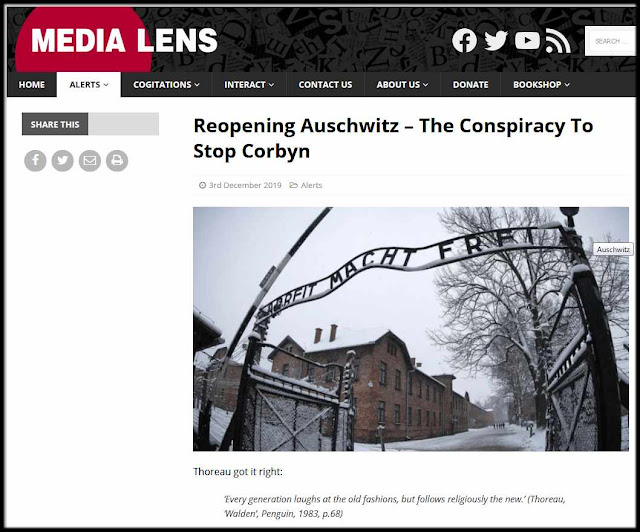
Corbyn was not just accused of anti-semitism and Holocaust denial; he was accused of being a de facto Nazi who ‘wants to reopen Auschwitz’. These claims were baseless and insane, but not ‘controversial’.
By contrast, we discovered what is deemed ‘controversial’ on Twitter on November 3. That day, we tried three times to tweet a link to a Red Pepper article by Lynne Segal as she ‘looks back on her experience of 40 years as a party member in [Corbyn’s] constituency’. We tweeted a screenshot of this important passage from Segal’s excellent piece:
‘Right now, along with the many other Jewish activists I know in Islington North, I am simply devastated that this process has climaxed in the suspension of our cherished MP, and former leader. It’s so hard to accept that I must repeat again what every Jewish member I know in Islington North has frequently confirmed and it is we who actually know and regularly meet with Jeremy Corbyn – unlike most of critics. What we can confirm is that as Jews in North Islington we have always felt more than safe, more than welcome, unfailingly supported, in everything we do in the borough, and the Party. As it happens, we often feel this all the more strongly as Jews, knowing that – unlike Corbyn – so many who choose to speak in our name completely disrespect our commitment to antisemitism and racism of all kinds in struggles for a better world, including the vital struggle for Palestinian rights.’
We also tweeted a screenshot of this passage:
‘So, let me provide a few pertinent facts. Over the years, Corbyn has had mutually supportive relations with the practising Jewish community in Islington, attending Shabbat dinners with the orthodox Chabad Rabbi, Mendy Korer, and attending numerous other official Jewish events in North London. Against some local resistance, Corbyn promoted the installation of a plaque on a demolished synagogue site in 2015 to celebrate Jewish life in the borough. Unlike most of his critics in Westminster, Corbyn unfailingly turned up to vote for motions addressing anti-Semitism in Parliament, just as he worked tirelessly against racism on every front.’
This is extremely powerful, credible evidence exposing the claims against Corbyn, not just as a sham, but as a monstrous reversal of the truth.
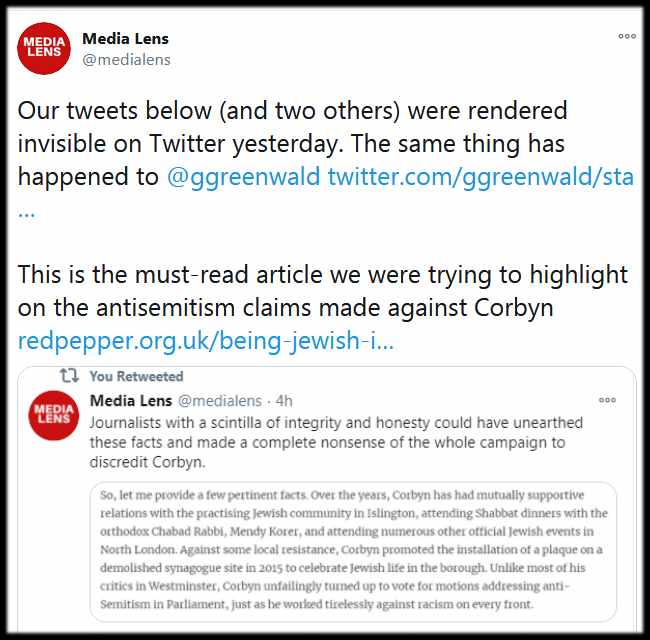
We know what our readers like and we know how they will likely react to our tweets, so we were surprised that the two tweeted screenshots did not immediately pick up a few likes and retweets. In fact, after four hours, they had not been liked or retweeted by anyone. We tried tweeting the screenshots again, and again they received no likes or retweets. We checked with friends and it became clear that while these tweets were visible to us, they had been secretly rendered invisible to everyone else by Twitter without us knowing. Unlike the smears unleashed on Corbyn for five years, our words had been banished because they were deemed ‘controversial’ by a giant, profit-maximising tech corporation. And we are not alone; we discovered that independent journalist Glenn Greenwald had earlier tweeted:
‘I posted this tweet 3 times and all 3 times it just won’t appear in my time-line, allowing nobody to see it. Genuinely confused. Is anyone else experiencing this problem?’
No surprise, Greenwald is also ‘controversial’, having, like Fisk, Corbyn and us, attracted ‘controversy’ ‘for his sharp criticism of the US and Israel, and of Western foreign policy’.
On Twitter, in response to corporate media censoring Donald Trump, science writer Marcus Chown commented:
‘This is what we DESPERATELY need in the UK. We need our media to interrupt speeches by Johnson and others and point out to viewers their lies. Retweet if you would like to seee [sic] this happen.’
If giant, profit-maximising, advertiser-dependent corporate media decide it is their job and right to censor political leaders like Trump and Johnson, they will have no qualms at all about censoring you, us, and everyone else. Is that what we want? What on earth qualifies Big Business as an arbiter of Truth?
DE
The Mideast reporting giant Robert Fisk covered Israel/ Palestine with courage and passion
By James North November 2, 2020 Mondoweiss
Robert Fisk was the best known English-language Middle East correspondent of a generation, and his death over the weekend at the age of 74 has prompted an outpouring of praise — along with some criticism.
The obituaries are citing his decades of work, mainly for the British Independent, and his two gigantic books: Pity the Nation (1990) and The Great War for Civilisation (2005), which are based on first-hand reporting from nearly every flashpoint in the Mideast since the mid-1970s. Fisk was there during the civil war in Lebanon, the Iran-Iraq war of 1980-88, the 2003 U.S. invasion of Iraq, and much more. He did unforgettable on-the-spot dispatches after the Sabra and Shatila massacres in Beirut in 1982, when the Israeli army stood by as Lebanese Christian militiamen slaughtered somewhere between 460 and 3,500 Palestinian refugees.
Robert Fisk’s decades of reporting on Israel/Palestine were especially valuable, contrasted with most mainstream U.S. media. Much of this coverage can be found in The Great War for Civilisation. He raised doubts about the 1993 Oslo “peace agreement” right from the start, asking ordinary skeptical Palestinians for their opinion instead of relying exclusively on high-level diplomats. He went to Israeli Jewish “settlements” in the West Bank, and did not cover up the hard, anti-Palestinian views he found there.
Fisk also interviewed the kind of Israelis who do appear in the U.S. mainstream, but he warned they aren’t representative:
. . . Dedi Zucker, a liberal member of the Knesset and leader of the Civil Rights Movement is very much in a minority; he is the sort of man — broad-minded, bespectacled, academic in appearance — whom visitors to Israel seek out to hear what they want to hear.
Robert Fisk also dissected the chronic bias, in language and interpretation, that has become so much a part of the mainstream reporting from Israel/Palestine that we often no longer even notice it:
When Palestinians murder Israelis, we regard them as evil men. When Israelis slaughter Palestinians, America and other Western nations find it expedient to regard these crimes as tragedies, misunderstandings or the work of individual madmen. Palestinians — in the generic, all-embracing sense of the word — are held to account for these deeds. Israel is not.
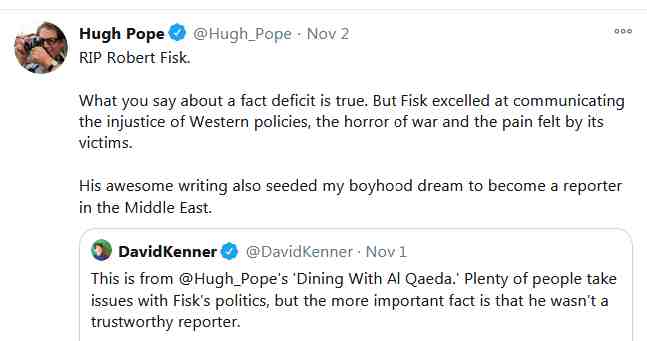
Fisk’s reporting in other parts of the Mideast has raised some doubts about his accuracy. Hugh Pope, also a distinguished Mideast journalist who is now with the International Crisis Group, a decade ago briefly listed some of Fisk’s distortions. Pope, in his own fascinating memoir Dining With Al Qaeda, says that other reporters had a word for it: “Fiskery.” Pope explained:
. . . the essential thrust of the story, and the political message behind it, might well be true, or, from the author’s point of view, illustrate a higher truth. But the details, quotes, witnesses, and even whole battles could be embellished to make the story fly, preferably onto the front page.
Pope suggests there may be extenuating circumstances that explain Fisk’s exaggerations. Western reporting that follows narrow mainstream conventions is dry, clinical — and in the end, arguably inaccurate in its own way. Pope continued:
Fisk’s writing, more than almost anyone else’s, manages to step around the cautious conventions of Middle Eastern reporting and drive home at an emotional level the injustices of the dictators and the cruel side of U.S. policies.
Huge Pope’s complicated view continues after Fisk’s death. The Twitter timeline is reproducing Pope’s skeptical view of Fisk’s accuracy. To which Pope responds:
What you say about a fact deficit is true. But Fisk excelled at communicating the injustice of Western policies, the horror of war and the pain felt by its victims.
Journalism and ‘the words of power’
Al Jazeera, 25 May 2010
The relationship between power and the media is about semantics, Robert Fisk told The Al Jazeera Forum in 2010.
25 May 2010
Editor’s Note: Robert Fisk, veteran Middle East correspondent of The Independent, died on Friday at the age of 74. During his decades-long career, he covered key international events including the Lebanese civil war, the Soviet invasion of Afghanistan, the Iranian revolution, Saddam Hussein’s invasion of Kuwait, conflicts in the Balkans and the Arab Spring.
As a regular contributor to Al Jazeera, he addressed the fifth annual Al Jazeera Forum on May 23, 2010 with a keynote speech in which he argued that journalists have become prisoners of the language of power.
Power and the media are not just about cosy relationships between journalists and political leaders, between editors and presidents. They are not just about the parasitic-osmotic relationship between supposedly honourable reporters and the nexus of power that runs between White House and state department and Pentagon, between Downing Street and the foreign office and the ministry of defence. In the western context, power and the media is about words – and the use of words.
It is about semantics.
It is about the employment of phrases and clauses and their origins. And it is about the misuse of history; and about our ignorance of history.
More and more today, we journalists have become prisoners of the language of power.
Is this because we no longer care about linguistics? Is this because lap-tops ‘correct’ our spelling, ‘trim’ our grammar so that our sentences so often turn out to be identical to those of our rulers? Is this why newspaper editorials today often sound like political speeches?
Let me show you what I mean.
For two decades now, the US and British – and Israeli and Palestinian – leaderships have used the words ‘peace process’ to define the hopeless, inadequate, dishonourable agreement that allowed the US and Israel to dominate whatever slivers of land would be given to an occupied people.
I first queried this expression, and its provenance, at the time of Oslo – although how easily we forget that the secret surrenders at Oslo were themselves a conspiracy without any legal basis. Poor old Oslo, I always think! What did Oslo ever do to deserve this? It was the White House agreement that sealed this preposterous and dubious treaty – in which refugees, borders, Israeli colonies – even timetables – were to be delayed until they could no longer be negotiated.
And how easily we forget the White House lawn – though, yes, we remember the images – upon which it was Clinton who quoted from the Qur’an, and Arafat who chose to say: “Thank you, thank you, thank you, Mr. President.” And what did we call this nonsense afterwards? Yes, it was ‘a moment of history’! Was it? Was it so?
Do you remember what Arafat called it? “The peace of the brave.” But I don’t remember any of us pointing out that “the peace of the brave” was used originally by General de Gaulle about the end of the Algerian war. The French lost the war in Algeria. We did not spot this extraordinary irony.
Same again today. We western journalists – used yet again by our masters – have been reporting our jolly generals in Afghanistan as saying that their war can only be won with a “hearts and minds” campaign. No-one asked them the obvious question: Wasn’t this the very same phrase used about Vietnamese civilians in the Vietnam war? And didn’t we – didn’t the West – lose the war in Vietnam?
Yet now we western journalists are actually using – about Afghanistan – the phrase ‘hearts and minds’ in our reports as if it is a new dictionary definition rather than a symbol of defeat for the second time in four decades, in some cases used by the very same soldiers who peddled this nonsense – at a younger age – in Vietnam.
Just look at the individual words which we have recently co-opted from the US military.
When we westerners find that ‘our’ enemies – al-Qaeda, for example, or the Taliban -have set off more bombs and staged more attacks than usual, we call it ‘a spike in violence’. Ah yes, a ‘spike’!
A ‘spike’ in violence, ladies and gentlemen is a word first used, according to my files, by a brigadier general in the Baghdad Green Zone in 2004. Yet now we use that phrase, we extemporise on it, we relay it on the air as our phrase. We are using, quite literally, an expression created for us by the Pentagon. A spike, of course, goes sharply up, then sharply downwards. A ‘spike’ therefore avoids the ominous use of the words ‘increase in violence’ – for an increase, ladies and gentlemen, might not go down again afterwards.
Now again, when US generals refer to a sudden increase in their forces for an assault on Fallujah or central Baghdad or Kandahar – a mass movement of soldiers brought into Muslim countries by the tens of thousands – they call this a ‘surge’. And a surge, like a tsunami, or any other natural phenomena, can be devastating in its effects. What these ‘surges’ really are – to use the real words of serious journalism – are reinforcements. And reinforcements are sent to wars when armies are losing those wars. But our television and newspaper boys and girls are still talking about ‘surges’ without any attribution at all! The Pentagon wins again.
Meanwhile the ‘peace process’ collapsed. Therefore our leaders – or ‘key players’ as we like to call them – tried to make it work again. Therefore the process had to be put ‘back on track’. It was a railway train, you see. The carriages had come off the line. So the train had to be put ‘back on track’. The Clinton administration first used this phrase, then the Israelis, then the BBC.
But there was a problem when the ‘peace process’ had been put ‘back on track’ – and still came off the line. So we produced a ‘road map’ – run by a Quartet and led by our old Friend of God, Tony Blair, who – in an obscenity of history – we now refer to as a ‘peace envoy’.
But the ‘road map’ isn’t working. And now, I notice, the old ‘peace process’ is back in our newspapers and on our television screens. And two days ago, on CNN, one of those boring old fogies that the TV boys and girls call ‘experts’ – I’ll come back to them in a moment – told us again that the ‘peace process’ was being put ‘back on track’ because of the opening of ‘indirect talks’ between Israelis and Palestinians.
Ladies and gentlemen, this isn’t just about clichés – this is preposterous journalism. There is no battle between power and the media. Through language, we have become them.
Maybe one problem is that we no longer think for ourselves because we no longer read books. The Arabs still read books – I’m not talking here about Arab illiteracy rates – but I’m not sure that we in the West still read books. I often dictate messages over the phone and find I have to spend ten minutes to repeat to someone’s secretary a mere hundred words. They don’t know how to spell.
I was on a plane the other day, from Paris to Beirut – the flying time is about three hours and 45 minutes – and the woman next to me was reading a French book about the history of the Second World War. And she was turning the page every few seconds. She had finished the book before we reached Beirut! And I suddenly realised she wasn’t reading the book – she was surfing the pages! She had lost the ability to what I call ‘deep read’. Is this one of our problems as journalists, I wonder, that we no longer ‘deep read’? We merely use the first words that come to hand …
Let me show you another piece of media cowardice that makes my 63-year-old teeth grind together after 34 years of eating humus and tahina in theMiddle East.
We are told, in so many analysis features, that what we have to deal with in the Middle East are ‘competing narratives’. How very cosy. There’s no justice, no injustice, just a couple of people who tell different history stories. ‘Competing narratives’ now regularly pop up in the British press. The phrase is a species – or sub-species – of the false language of anthropology. It deletes the possibility that one group of people – in the Middle East, for example – are occupied, while another group of people are doing the occupying. Again, no justice, no injustice, no oppression or oppressing, just some friendly ‘competing narratives’, a football match, if you like, a level playing field because the two sides are – are they not – ‘in competition’. It’s two sides in a football match. And two sides have to be given equal time in every story.
So an ‘occupation’ can become a ‘dispute’. Thus a ‘wall’ becomes a ‘fence’ or a ‘security barrier’. Thus Israeli colonisation of Arab land contrary to all international law becomes ‘settlements’ or ‘outposts’ or ‘Jewish neighbourhoods’.
You will not be surprised to know that it was Colin Powell, in his starring, powerless appearance as secretary of state to George W. Bush, who told US diplomats in the Middle East to refer to occupied Palestinian land as ‘disputed land’ – and that was good enough for most of the American media.
So watch out for ‘competing narratives’, ladies and gentlemen. There are no ‘competing narratives’, of course, between the US military and the Taliban. When there are, however, you’ll know the West has lost.
But I’ll give you a lovely, personal example of how ‘competing narratives’ come undone. Last month, I gave a lecture in Toronto to mark the 95th anniversary of the 1915 Armenian genocide, the deliberate mass murder of one and a half million Armenian Christians by the Ottoman Turkish army and militia. Before my talk, I was interviewed on Canadian Television, CTV, which also owns the Toronto Globe and Mail newspaper. And from the start, I could see that the interviewer had a problem. Canada has a large Armenian community. But Toronto also has a large Turkish community. And the Turks, as the Globe and Mail always tell us, “hotly dispute” that this was a genocide. So the interviewer called the genocide “deadly massacres”.
Of course, I spotted her specific problem straight away. She could not call the massacres a ‘genocide’, because the Turkish community would be outraged. But equally, she sensed that ‘massacres’ on its own – especially with the gruesome studio background photographs of dead Armenians – was not quite up to defining a million and a half murdered human beings. Hence the ‘deadly massacres’. How odd!!! If there are ‘deadly’ massacres, are there some massacres which are not ‘deadly’, from which the victims walk away alive? It was a ludicrous tautology.
In the end, I told this little tale of journalistic cowardice to my Armenian audience, among whom were sitting CTV executives. Within an hour of my ending, my Armenian host received an SMS about me from a CTV reporter. “Shitting on CTV was way out of line,” the reporter complained. I doubted, personally, if the word ‘shitting’ would find its way onto CTV. But then, neither does ‘genocide’. I’m afraid ‘competing narratives’ had just exploded.
Yet the use of the language of power – of its beacon-words and its beacon-phrases -goes on among us still. How many times have I heard western reporters talking about ‘foreign fighters’ in Afghanistan? They are referring, of course, to the various Arab groups supposedly helping the Taliban. We heard the same story from Iraq. Saudis, Jordanians, Palestinian, Chechen fighters, of course. The generals called them ‘foreign fighters’. And then immediately we western reporters did the same. Calling them ‘foreign fighters’ meant they were an invading force. But not once – ever – have I heard a mainstream western television station refer to the fact that there are at least 150,000 ‘foreign fighters’ in Afghanistan. And that most of them, ladies and gentlemen, are in American or other Nato uniforms!
Similarly, the pernicious phrase ‘Af-Pak’ – as racist as it is politically dishonest – is now used by reporters when it originally was a creation of the US state department, on the day that Richard Holbrooke was appointed special US representative to Afghanistan and Pakistan. But the phrase avoided the use of the word ‘India’ whose influence in Afghanistan and whose presence in Afghanistan, is a vital part of the story. Furthermore, ‘Af-Pak’ – by deleting India – effectively deleted the whole Kashmir crisis from the conflict in south-east Asia. It thus deprived Pakistan of any say in US local policy on Kashmir – after all, Holbrooke was made the ‘Af-Pak’ envoy, specifically forbidden from discussing Kashmir. Thus the phrase ‘Af-Pak’, which totally deletes the tragedy of Kashmir – too many ‘competing narratives’, perhaps? – means that when we journalists use the same phrase, ‘Af-Pak’, which was surely created for us journalists, we are doing the state department’s work.
Now let’s look at history. Our leaders love history. Most of all, they love the Second World War. In 2003, George W. Bush thought he was Churchill as well as George W. Bush. True, Bush had spent the Vietnam war protecting the skies of Texas from the Vietcong. But now, in 2003, he was standing up to the ‘appeasers’ who did not want a war with Saddam who was, of course, ‘the Hitler of the Tigris’. The appeasers were the British who did not want to fight Nazi Germany in 1938. Blair, of course, also tried on Churchill’s waistcoat and jacket for size. No ‘appeaser’ he. America was Britain’s oldest ally, he proclaimed – and both Bush and Blair reminded journalists that the US had stood shoulder-to-shoulder with Britain in her hour of need in 1940.
But none of this was true.
Britain’s old ally was not the United States. It was Portugal, a neutral fascist state during World War Two. Only my own newspaper, The Independent, picked this up.
Nor did America fight alongside Britain in her hour of need in 1940, when Hitler threatened invasion and the German air force blitzed London. No, in 1940 America was enjoying a very profitable period of neutrality – and did not join Britain in the war until Japan attacked the US naval base at Pearl Harbour in December of 1941.
Ouch!
Back in 1956, I read the other day, Eden called Nasser the ‘Mussolini of the Nile’. A bad mistake. Nasser was loved by the Arabs, not hated as Mussolini was by the majority of Africans, especially the Arab Libyans. The Mussolini parallel was not challenged or questioned by the British press. And we all know what happened at Suez in 1956.
Yes, when it comes to history, we journalists really do let the presidents and prime ministers take us for a ride.
Today, as foreigners try to take food and fuel by sea to the hungry Palestinians of Gaza, we journalists should be reminding our viewers and listeners of a long-ago day when America and Britain went to the aid of a surrounded people, bringing food and fuel – our own servicemen dying as they did so – to help a starving population. That population had been surrounded by a fence erected by a brutal army which wished to starve the people into submission. The army was Russian. The city was Berlin. The wall was to come later. The people had been our enemies only three years earlier. Yet we flew the Berlin airlift to save them. Now look at Gaza today. Which western journalist – and we love historical parallels – has even mentioned 1948 Berlin in the context of Gaza?
Look at more recent times. Saddam had ‘weapons of mass destruction’ – you can fit ‘WMD’ into a headline – but of course, he didn’t, and the American press went through embarrassing bouts of self-condemnation afterwards. How could it have been so misled, the New York Times asked itself? It had not, the paper concluded, challenged the Bush administration enough.
And now the very same paper is softly – very softly – banging the drums for war in Iran. Iran is working on WMD. And after the war, if there is a war, more self-condemnation, no doubt, if there are no nuclear weapons projects.
Yet the most dangerous side of our new semantic war, our use of the words of power – though it is not a war since we have largely surrendered – is that it isolates us from our viewers and readers. They are not stupid. They understand words, in many cases – I fear – better than we do. History, too. They know that we are drowning our vocabulary with the language of generals and presidents, from the so-called elites, from the arrogance of the Brookings Institute experts, or those of the Rand Corporation or what I call the ‘TINK THANKS’. Thus we have become part of this language.
Here, for example, are some of the danger words:
· POWER PLAYERS
· ACTIVISM
· NON-STATE ACTORS
· KEY PLAYERS
· GEOSTRATEGIC PLAYERS
· NARRATIVES
· EXTERNAL PLAYERS
· PEACE PROCESS
· MEANINGFUL SOLUTIONS
· AF-PAK
· CHANGE AGENTS (whatever these sinister creatures are).
I am not a regular critic of Al Jazeera. It gives me the freedom to speak on air. Only a few years ago, when Wadah Khanfar (now Director General of Al Jazeera) was Al Jazeera’s man in Baghdad, the US military began a slanderous campaign against Wadah’s bureau, claiming – untruthfully – that Al Jazeera was in league with al-Qaeda because they were receiving videotapes of attacks on US forces. I went to Fallujah to check this out. Wadah was 100 per cent correct. Al-Qaeda was handing in their ambush footage without any warning, pushing it through office letter-boxes. The Americans were lying.
Wadah is, of course, wondering what is coming next.
Well, I have to tell you, ladies and gentlemen, that all those ‘danger words’ I have just read out to you – from KEY PLAYERS to NARRATIVES to PEACE PROCESS to AF-PAK – all occur in the nine-page Al Jazeera programme for this very forum.
I’m not condemning Al Jazeera for this, ladies and gentlemen. Because this vocabulary is not adopted through political connivance. It is an infection that we all suffer from – I’ve used ‘peace process’ a few times myself, though with quotation marks which you can’t use on television – but yes, it’s a contagion.
And when we use these words, we become one with the power and the elites which rule our world without fear of challenge from the media. Al Jazeera has done more than any television network I know to challenge authority, both in the Middle East and in the West. (And I am not using ‘challenge’ in the sense of ‘problem’, as in ‘”I face many challenges,” says General McCrystal.’)
How do we escape this disease? Watch out for the spell-checkers in our lap-tops, the sub-editor’s dreams of one-syllable words, stop using Wikipedia. And read books – real books, with paper pages, which means deep reading. History books, especially.
Al Jazeera is giving good coverage to the flotilla – the convoy of boats setting off for Gaza. I don’t think they are a bunch of anti-Israelis. I think the international convoy is on its way because people aboard these ships – from all over the world – are trying to do what our supposedly humanitarian leaders have failed to do. They are bringing food and fuel and hospital equipment to those who suffer. In any other context, the Obamas and the Sarkozys and the Camerons would be competing to land US Marines and the Royal Navy and French forces with humanitarian aid – as Clinton did in Somalia. Didn’t the God-like Blair believe in humanitarian ‘intervention’ in Kosovo and Sierra Leone?
In normal circumstances, Blair might even have put a foot over the border.
But no. We dare not offend the Israelis. And so ordinary people are trying to do what their leaders have culpably failed to do. Their leaders have failed them.
Have the media? Are we showing documentary footage of the Berlin airlift today? Or of Clinton’s attempt to rescue the starving people of Somalia, of Blair’s humanitarian ‘intervention’ in the Balkans, just to remind our viewers and readers – and the people on those boats – that this is about hypocrisy on a massive scale?
The hell we are! We prefer ‘competing narratives’. Few politicians want the Gaza voyage to reach its destination – be its end successful, farcical or tragic. We believe in the ‘peace process’, the ‘road map’. Keep the ‘fence’ around the Palestinians. Let the ‘key players’ sort it out.
Ladies and gentlemen, I am not your ‘key speaker’ this morning.
I am your guest, and I thank you for your patience in listening to me.
Source : Al Jazeera
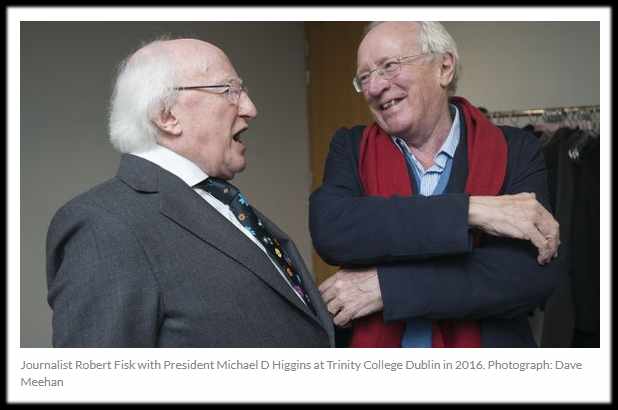
My friend did not invent the old journalistic saying ‘never believe anything until it is officially denied’ but he was highly sceptical of government sources, writes Patrick Cockburn
Independent, Tuesday 03 November 2020 11:54
I first met Robert in Belfast in 1972 at the height of the Troubles when he was the correspondent for The Times and I was writing a PhD on Irish history at Queen’s University.
I was also taking my first tentative steps as a journalist, while he was swiftly establishing a reputation as a meticulous and highly-informed reporter, one who responded sceptically – and rigorously investigated – the partisan claims of all parties, be they gunmen, army officers or government officials.
Our careers moved in parallel directions because we were interested in the same sort of stories. We both went to Beirut in the mid-1970s to write about the Lebanese Civil War and the Israeli invasions. We often reported the same grim events, such as the Sabra and Shatila massacre of Palestinians by Israeli-backed Christian militiamen in 1982, but we did not usually travel together because, aside from the fact that Robert usually liked to work alone, we wrote for competing newspapers.
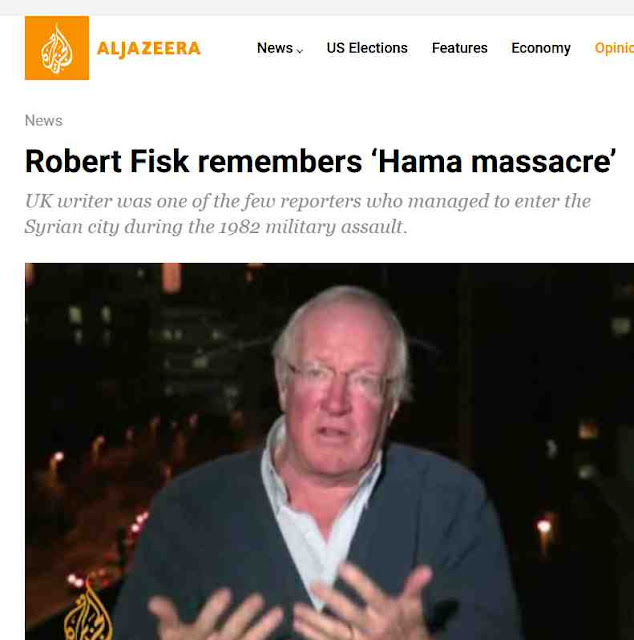
When we did travel together during the wars, I was always impressed by Robert’s willingness to take risks, but to do so without bravado, making sure we had the right driver and the car had petrol that had not been watered down. One reason he had so many journalistic scoops – such as finding out about the massacre of 20,000 people in Hama by Hafez al-Assad in Syria in 1982 – was that he was an untiring traveller. One friend recalls that:
“He was the only person I’ll ever know who could, almost effortlessly, make up limericks about the south Lebanese villages, while he was driving through them.”
Yet there was a deadly serious reason why he was visiting those villages. When I was a correspondent in Jerusalem in the 1990s, they were the repeated target for Israeli airstrikes, which the Israeli military would declare were solely directed at “terrorists” and, if there were any dead and wounded, they were invariably described as gunmen who deserved their fate. Almost nobody checked if this was true – except Robert, who would drive to these same shattered villages and report in graphic detail about the dead bodies of men, women and children, and interview the survivors.
Robert was suited to Beirut with its free and somewhat anarchic atmosphere, a place always on edge and with people – Lebanese, Palestinian, exiles of all sorts – who were born survivors, though sometimes the odds against them were too great. Robert had a natural sympathy for their sufferings and a rage against those who inflicted them. His sympathy was not confined to present-day victims: for decades he wrote about the Armenian genocide, carried out by the Ottoman Turks during the First World War. He would publicise diaries and documents about the mass slaughter of the Armenians, stories which other correspondents felt it could be better left to the historians.
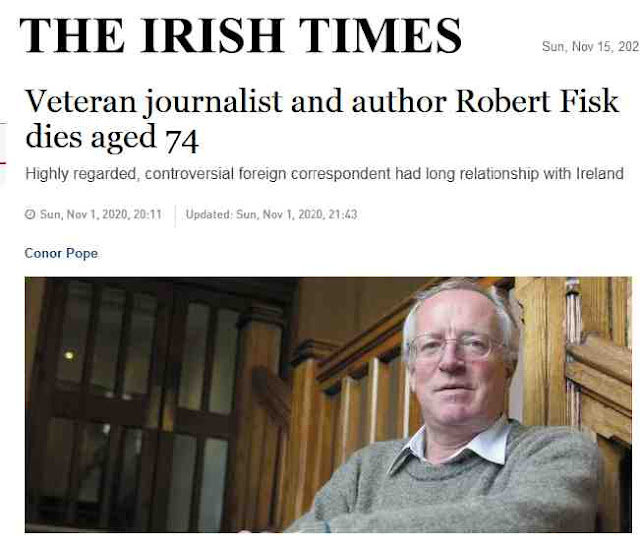
But Robert was more than a journalist cataloguing present-day developments and woes. He was a historian as well as a reporter who wrote, among many other books, The Great War for Civilisation: The Conquest of the Middle East. I never finished my PhD in Belfast because the violence became too intense for academic work, but Robert did get his doctorate from Trinity college for his thesis on Irish neutrality in the Second World War. My point is that Robert was more than a person who covered “the news”, since his journalism – for all his scoops and revelations – had such depth because he was, in many respects, “a historian of the present”.
He was also, of course, a magnificent reporter who bubbled with nervous energy, often shifting his weight from one foot to the other, notebook in his hand, as he questioned people and probed into what had really occurred. He took nothing for granted and was often openly contemptuous of those who did. He did not invent the old journalist saying “never believe anything until it is officially denied” but he was inclined to agree with its sceptical message. He was suspicious of journalists who cultivated diplomats and “official sources” that could not be named and whose veracity we are invited to take on trust.
Some have responded to his criticism with baffled resentment: during the US-led counter-invasion of Kuwait in 1991, one embedded American journalist complained that Robert was unfairly reporting on events, knowledge of which should have been confined to an officially sanctioned “pool” of correspondents. Another American journalist based in London in the early 1980s once said to me that Robert was a magnificent writer and reporter, but the American had been struck by the number of his colleagues who grimaced at Robert’s name. “I have thought about this,” he told me, “and I think that 80 per cent of the reason for this is pure envy on their part.”
We saw more of each other after we both joined The Independent, Robert in 1989 and myself in 1990, on the eve of the first Gulf War. I was mostly in Iraq during the fighting and Robert was in Kuwait. Twelve years later we met in Baghdad after the overthrow of Saddam Hussein and drove out together over land across the desert to Jordan. I recall that we were stopped for a long time on the Jordanian side of the border because Robert had secured, from the wreckage of some police station, in Basra in southern Iraq, a file of laudatory poems written to Saddam’s ferocious police chief in the city by his underlings on the occasion of his birthday. Some of the Jordanian officials thought that these craven offerings were hilarious, but others found the documents mysterious and kept us waiting for hours at the bleak border post while they waited for official permission to let us cross.
As we grew older, we grew closer. We had similar doubts about the beneficial outcome of the so-called Arab Spring in 2011, having seen similar optimism about the invasion of Iraq in 2003 produce a paroxysm of violence. Neither of us believed that Bashar al-Assad and his regime was going to fall, at a time when this was conventional wisdom among politicians and in the media. To suggest anything to the contrary got one immediately targeted as a supporter of Assad. The sensible course was to ignore these diatribes and Robert and I used to counsel each other not to overreact and thereby give legs to some crudely mendacious tales.
Over the last 15 years we talked almost once a week about everything from the state of the world to the state of ourselves, supplementing phone calls with periodic emails. A life spent describing crises and wars made him more philosophical about the coronavirus pandemic than those with less direct experience of calamities. In one of the last emails I received from him, he wrote that
“Covid-19, unless it suddenly turns into a tiger, will be seen as just another risk to human life – like car crashes, cancer, war, etc. Human’s don’t necessarily fight disease, injustice and sorrow. They just survive and bash on regardless.”
Journalist was reportedly admitted to hospital after suffering a suspected stroke Guardian 1.11.20.
Robert Fisk, veteran Middle East correspondent, dies aged 74
Robert Fisk doubts Syria sanctions will work
Robert Fisk remembers ‘Hama massacre’
Fisk: New world in Middle East
Highly regarded, controversial foreign correspondent had long relationship with Ireland Irish Times 1 November 2020